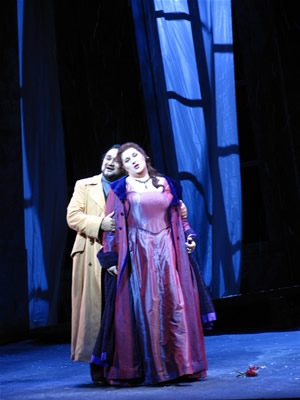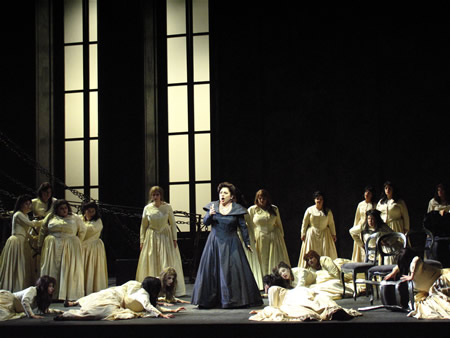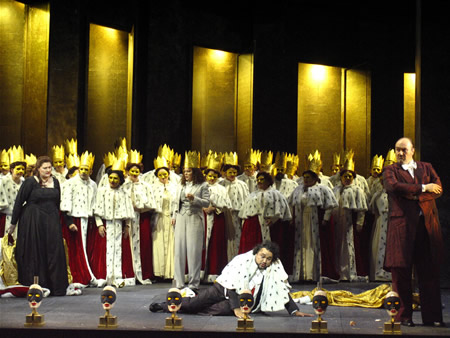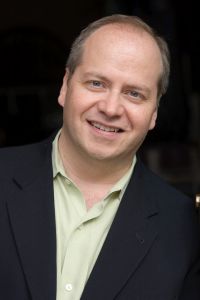Verdi's Tragedy "The Masked Ball"
Brings Joy to Houston Opera Attendees
By: Harley Schlanger
November 2007
"Un Ballo in Maschera"
Giuseppe Verdi, Composer
Houston Grand Opera
October - November 2007
A Verdi opera - especially one from his "middle period" onward - performed well, offers those in attendance one of the most sublime and uplifting evenings one can experience on this planet. When the opera is one of his tragedies, such as "The Masked Ball," that experience is magnified further, as Verdi provides the members of his audience deep insights into the essence of history, of those special human qualities, which have allowed mankind to progress, as well as those tragic flaws in society which lead to wars, chaos, and social disintegration.
Theatergoers in Houston were once again treated to Verdi at his best, in the recent production of "The Masked Ball" by Houston Grand Opera (HGO). A good performance of a Verdi opera requires several things: skilled singers, trained in the best Bel Canto tradition; a conductor who grasps the nuances and complexities in the score, and an orchestra which responds to his leadership; a chorus which sings transparently, so the interplay between the different vocal species (i.e., tenors, sopranos, etc.) is clear; and sets which evoke the historic setting of the opera, but are not distracting.
The HGO production of "The Masked Ball" featured all of these qualities, and more -- one could gain, from the experience, a glimpse into the mind of the creative artist, and grasp his intention: to use his great talents to develop the capacities of his beloved Italian compatriots to establish a unified nation, and build institutions of self-government, a true republic.
Classical Tragedy As History
Classical tragedy must never be reduced to being treated as mere "entertainment." From the time of Aeschylus and Sophocles, tragedians have been historians, using the stage to present the real history of nations. In his numerous articles on tragedy over the recent decades, Lyndon LaRouche has written repeatedly of how tragedy functions. Verdi's tragedies "were not soap operas, they were not stories, they were not entertainment. They were showing people, ordinary people, history. They were showing how people destroyed themselves in real history." (1.)
The tragedian takes an historical event, which is known to his audience, and places it in front of them. The intention is to demonstrate to members of the audience that they do not live outside of history, but are part of the long arc of the development of civilization, and face the same kind of existential questions as the historical figures and cultures on the stage.
One of the most common, and significant, of the themes taken up by the great classical dramatists, is that of destiny, of fate, the idea that it is futile to "go against the grain," as an outcome is, in effect, "predetermined." LaRouche writes, "In all Classical tragedy, some voiceless force of will, such as the ghost of Hamlet, grips the ensemble of the parts played by nearly all among the principle players in the drama. Those characters can not free themselves from the grip of that encompassing destiny over their will."
It appears as "a silent, invisible power which herds the members of society, by force of will, into a restricted range of allowed choices of behavior," he adds, functioning as a kind of "silent electric fence," which constrains the characters from acting on behalf of their true self interests, or those of the nation, impelling "individuals, or entire societies, to destroy themselves...as did the doomed characters from Shakespeare's Julius Caesar, or Macbeth, or Hamlet."
Members of the audience, in viewing these self-doomed individuals as they proceed toward the tragic end, ask themselves, "What had gripped the characters on stage such that each performed as under the grip of an unseen wicked will, compelled to act as if by the whim of a higher, unseen, voiceless power?" (2.)
The best of Verdi's operas clearly fall within this category of great Classical tragedy. Verdi was profoundly influenced by two of the greatest tragic dramatists, William Shakespeare and Friedrich Schiller, both of whom wrote their tragedies as real history, as LaRouche has described it. Verdi composed operas from Shakespeare's Macbeth and Othello, and was working on King Lear, when the opportunity arose to do "The Masked Ball." He also composed operas from Schiller's "Virgin of Orleans" ("Giovanna d'Arco"), "The Robbers" ("I Masnadieri"), "Kabale und Liebe" ("Luisa Miller"), and, of course, "Don Carlo."
"The Masked Ball" As Classical Tragedy
To have "The Masked Ball" performed in Italy, Verdi had to overcome what appeared to be a powerful fate, conspiring against him. The story of the opera is that of the assassination of King Gustavus III of Sweden, a reformer who attacked the despotism of the aristocrats in Sweden, and was an initiator of the League of Armed Neutrality in 1780, which aided the American Revolution against the British Empire.
The King was assassinated at a masked ball in 1792, in the midst of an ongoing battle over the nation's future, against Swedish aristocrats who were unwilling to give up their claims to power.
This history was well known in Verdi's time, as those fighting for Italian unification and the establishment of a republic -- which included Verdi -- were embroiled in a similar conflict with the aristocratic families of the Italian peninsula, which preferred deals with foreign empires to ceding power to a new, national government.
As rehearsals were proceeding for the premiere of "The Masked Ball" in Naples, in January 1858, a follower of the Italian Jacobin Mazzini, Felice Orsini, attempted to assassinate France's Emperor Napoleon III. Since an opera about the assassination of a king might be seen as provocative, Neapolitan censors demanded that Verdi make drastic changes. This postponed its opening until February 1859, when it opened in Rome, with the setting changed from Sweden to Boston, in the early 18th century. (3.)
The opera centers around a series of paradoxes, which Verdi develops beautifully, through musical counterpoint. These paradoxes inform the members of the audience that what they see, initially, unfolding on the stage, and hear, in the opening chorus, does not describe the underlying reality, which is that "some voiceless force of will" is controlling the behavior of everyone in the opera, and it is this "force" which actually determines the outcome of the events which will occur on stage.
 ©Houston Grand Opera. Photo by Andrew Cloud Riccardo (Ramón Vargas) and Amelia (Tamara Wilson) |
As the curtain opens on a majestic setting in the Governor's palace, a chorus of citizens sings of their love for their wise Governor, and of the peace in the land. It soon becomes evident, however, that all is not so peaceful, and that the Governor has enemies plotting against him.
When he makes his grand entrance, the Governor, Riccardo, appears to be a wise, benevolent leader, deserving the love of his people. His first words, following his greeting, are both noble and stirring: "Power is glorious when it brings happiness to its subjects."
He is immediately distracted, though, when his thoughts turn to Amelia, who is both the wife of his first councilor and closest ally, Renato, as well as the subject of his obsession. His first aria, his statement of love for her, is one of those memorable Verdi pieces, which simultaneously takes in the unsuspecting viewer -- who is moved by the power and the beauty of this "music of love" -- even as it exposes the weakness of Riccardo, whose noble pronouncement about bringing happiness to his subjects is contradicted by his admission that thinking of Amelia "makes me forget all my great projects."
Verdi then presents the next clue, to show the problem is bigger than merely an obsession controlling the Governor. As Riccardo sings, "It will be Paradise to see her again," Verdi introduces the conspirator's theme in the background, as a fugue, which continues as an ongoing counterpoint throughout the opera. It is unsettling when first heard, and it is heard again and again.
A Corrupted Population
and a Distracted Governor
The paradox is reinforced when Renato makes his appearance on the stage. He tells Riccardo that "Everyone is praising you," but then adds that he knows why Riccardo appears to be sad. Riccardo is startled, fearing that Renato knows that he desires his wife. Instead, Renato tells him that traitors are planning to kill him. The Governor waves it off, saying, "Oh, that's all," then repeating, "May the love of my citizens protect me."
Fearful that Riccardo's bravado might leave him vulnerable to an assassination, Renato sings of his deep concern -- that it is not just his fear that Riccardo's carelessness could lead to his death, but that his death would be a blow to the country. This is one of Verdi's best baritone arias, full of warmth for Riccardo, and of passionate concern for the nation. It is also foreboding, and, above all, it is truthful.
Renato sings: "Your life is so promising, so full of hope, And the destiny of thousands of lives is linked to yours. Without you, what would become of our country?
"You think no harm will come to you, Because the love of the citizens will be your shield. But hatred strikes its victims more swiftly than love."
 ©Houston Grand Opera. Photo by Andrew Cloud The fortune teller Ulrica (Ewa Podleś) beckons the spirits. |
It is in this aria that Riccardo's fate is revealed, in Renato's prophecy, which is more causally truthful than that made by the sorceress Ulrica in the next scene. For ultimately, it is Renato who becomes the killer, when he joins the conspiracy against Riccardo, after discovering him with his wife. His love, loyalty, and concern for Riccardo is quickly transformed into rage and hatred, as he had described the process in his aria.
The famous scene in the den of the sorceress is often pointed to as the moment when the prophecy of the coming death of Riccardo is made. While it is true that she does forewarn that his death is near, that had already been stated by Renato in the previous scene. Ulrica's scene serves another purpose: It demonstrates that the "people" are not as noble as might have been thought from the opening.
Indeed, many of the citizens whom Riccardo believes love him, are in thrall to this conjurer of Satan, as Oscar (Riccardo's page) confirms. When defending Ulrica, Oscar states that "People of all classes crowd around her." When Renato tries to warn Riccardo against a trip to Ulrica's den, saying it is too dangerous, Riccardo again shrugs him off, saying, "Let's go enjoy ourselves."
 ©Houston Grand Opera. Photo by Andrew Cloud The dying Riccardo (Ramón Vargas, center) forgives his assassin and friend Renato (Carlo Guelfi, right) |
This gets to the heart of the tragedy, that of the overall corruption of the society, such that its demise appears predestined, as the day-to-day behavior, the habitual way of thinking of virtually everyone, DOES NOT CHANGE. Verdi, a supporter of the unification of Italy under a constitutional monarchy, is concerned about two problems. First, there is the problem openly exposed in the opera, that a section of the aristocracy will plot against anyone organizing to take away their power, as did the conspirators who killed Sweden's Gustavus III. Such conspirators existed among the nobility in Italy in Verdi's era, and many of them were conspiring against national unification.
As serious a problem is that of the general corruption of the society, which is reflected in the behavior of a leader who is a populist, who appeals to the backwardness of the citizenry, rather than challenging them. Riccardo's concern to do what is right for the people is undermined by his unwillingness to give up his fantasy for Amelia, until it is too late, and Renato is turned against him, sealing his fate. But he is also blind to the hold that superstition -- a specific, and prevalent form of backwardness -- has on his people, which makes them highly susceptible to manipulation, and, thus, incapable of acting to defend their nation.
Thus, the "voiceless force of will" grips all segments of the population. The failure to recognize these problems leads, seemingly inevitably, to the murder of the Governor, at the hand of his most trusted friend, Renato.
Verdi, through this tragedy, is thus posing this most profound question to his audience: And what, then, will become of our nation?
Houston Grand Opera Does Justice to Verdi
The production by HGO allowed Verdi to communicate directly with the audience in Houston, but I do have one bone to pick with the production. Why set the opera "In a kingdom, once upon a time," instead of Boston, or Sweden? I trust this was not forced on HGO by "censors".
Otherwise, the singers were excellent. Special mention must be made of Riccardo, played with playfulness and passion by Ramon Vargas. Riccardo must be dignified, and yet credible as one who is overwhelmed by his love for Amelia, and blindly dismissive of the warnings that his life in endangered. His cheerful singing is a counterpoint to the grumbling conspirators, and Vargas sang effortlessly, as he moved from one mood to another, presenting a Riccardo who was attractive, without covering up his flaws. Vargas has a resume notable both for the scope of his travels, and for the emphasis on primarily the great Bel canto tenor roles of Verdi. (4.)
Tamara Wilson, as Amelia, handled this demanding role well, hitting the notes in the upper register without straining, making her character's anguish real. Wilson, an alumna of HGO Studio, is another young singer being given an opportunity to polish her skills with HGO.
Carlo Guelfi was a powerful Renato. He pulled off the full range of emotions in the Act II scene with Riccardo and Amelia, from his expressions of concern for Riccardo's safety, to the humiliation he experiences at the hands of the mocking conspirators, after discovering that the woman with Riccardo was his wife, and finally, to his rage-driven pledge to avenge the betrayal by his wife and his close friend. Guelfi, like Vargas, has a resume filled with Bel Canto roles. He will sing Iago in Verdi's "Otello" at the Met later this season.
 ©Houston Grand Opera. Photo by Andrew Cloud Patrick Summers, conductor |
A special bonus was the appearance of noted Polish contralto Ewa Podles as Ulrica. Her portrayal was, to say the least, quite spooky; her vocal range was huge, as she hit the lowest notes in full voice, before soaring into her upper register, with incredible facility. She added the exclamation point to the prophecy made by Renato in the first act, serving as a further visible confirmation that there was something rotten in Riccardo's land.
As always, the orchestra under Patrick Summers was excellent. The orchestration of Verdi in his "middle period" becomes more demanding, more "layered," as he utilizes every instrument, to create additional voices, beyond those of the featured singers and the chorus (which was, as usual, excellent). Verdi himself described the operas of this period as an "attempt at the fusion of music and drama," with a more tightly unified composition. The orchestra, at times, serves as the "voice from beyond," as in the fugal counterpoint of the conspirator's theme. Summers conducted with an intensity which matched that of the singers.
1. Lyndon LaRouche, "Italy's Leadership in World History Today" (Executive Intelligence Review -- EIR, November 9, 2000), under subhead, "The Importance of Verdi".
2. These quotes are from Lyndon LaRouche, "The Mask of Nancy Pelosi: The Force of Tragedy" (EIR, November 9, 2007).
3. While moving the setting of the opera from Sweden to Boston represents a change in "historical specificity" -- which is generally an unacceptable practice, often done by directors trying to "update" the drama, intending to make it more "relevant" -- LaRouche writes that "the authority of the opera ["Masked Ball"] as a Classical tragedy, lies in its historical specificity governing the composer's intention in crafting that composition, and is preserved in that fashion." He adds that this intention was understood at the time, as the "real-life assassination and its international implications were widely known in Verdi's time." (LaRouche, "Marat, De Sade, and Greenspin," (EIR, June 29, 2001).
4. The HGO production was dedicated to the memory of the recently departed tenor Luciano Pavarotti, who stated that Riccardo was his favorite Verdi role. Vargas wrote a Dedication to Pavarotti, in which he referred to having been inspired by hearing him sing Riccardo live; "his identification with the role, his generous singing, his electrifying phrasing and exuberant voice left an indelible impression in my memory which has been a fountain of inspiration for me...." Vargas' performance in this opera may serve as an inspiration to another generation of tenors.
